What Are Empaths?
An empath feels the emotions of another as if those emotions were her own. Ellie is empathic. She has a representation of what is going on inside her body. At the same time, Ellie focuses on Sam, forming a representation of Sam’s emotions. The two representations become blurred, causing Ellie to feel Sam’s emotions. This can be confusing and overwhelming for Ellie because she can’t separate out her feelings from Sam’s.
Types of Empaths
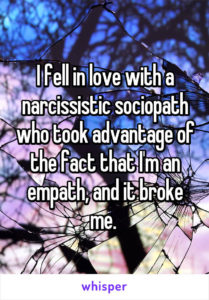 There are two types of empaths: affective empaths and cognitive empaths.
There are two types of empaths: affective empaths and cognitive empaths.
Affective Empath
An affective empath, also known as an emotional empath, is someone like Ellie. She literally feels the emotions of another as if they were her own.
Cognitive Empath
A cognitive empath is someone who recognizes the emotions of another but does not experience emotions directly.
Cognitive empathy can be taught. Some people are born with affective empathy, while others can develop affective empathy.
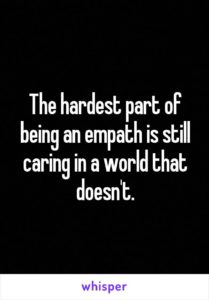
Is It Rare To Be An Empath?
Research suggests that 20% of the population are emotionally sensitive, and 5% are true empaths. Innate affective empathy appears to rare.
What Does It Mean To Be An Empath?
You may feel other people’s emotions, which can be overwhelming. Imagine walking into a store and feeling the emotions of the shoppers and the employees? Many empaths report that they can be paralyzed by large groups of people.
You may be introverted. Since you feel emotions so intensely, you may tend not to want to be with others. Many empaths prefer to be alone, even though they become lonely. They find loneliness less painful that feeling other people’s emotions.
You may be highly intuitive. Neuroscience has discovered that intuition is highly developed pattern recognition. You may patterns where non-empaths are blind. Pattern recognition allows for fast decisions and judgments. You may rely on your intuition for making many life decisions.
You need alone time. The presence of other people bothers you You are exhausted trying to deal with the flood of feelings you experience. You need time alone to rest and recharge.
You might be overwhelmed in intimate relationships. Many intimate partners experience relationship conflicts. Jealousy, judgment, criticism, sarcasm, or any number of other unpleasant partner behaviors can upset you.
You may be a target for energy vampires. Energy vampire describes people who demand too much attention and expect others to fill their needs. You may attract these difficult people because you are a good listeners and give your time freely.
You seek nature. The absence of a human presence in a natural surrounding soothes your frayed senses. You love to walk in meadows or on a beach where you can be alone.
You have a huge heart but sometimes give too much. You see and feel the pain of others and want to help. If you do not have good boundaries, you may give too much and harm yourself.
Youare highly sensitive because you do not have the filters of non-empaths. Consequently, you receive much more information from the world. You are exquisitely sensitive to the feelings of people near them.
What Are The 26 Indications That You Are An Empath?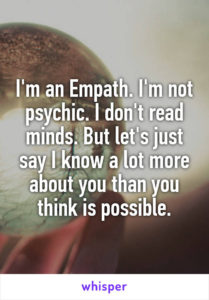
- You feel other peoples’ emotions as your own
- Closeness and intimacy can overwhelm you
- You have good intuition
- You take comfort in nature
- You don’t do well in crowded places
- You have a hard time not caring
- People tend to tell you their problems
- You have a high sensitivity to sounds, smells, or sensations
- You need time to recharge
- You don’t like conflict
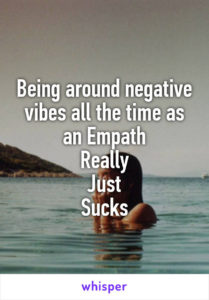
- You often feel like you don’t fit in.
- You tend to isolate
- You have a hard time setting boundaries
- You see the world in unique ways
- Sometimes you experience sudden, overwhelming emotions when you’re in public
- The “vibe” of a room matters to you — a lot
- You understand where people are coming from
- People turn to you for advice
- Tragic or violent events on TV can completely incapacitate you
- You can’t contain your love of pets, animals, or babies
- You might feel people’s physical illnesses too — not just their emotions
- You can become overwhelmed in intimate relationships
- You’re a walking lie detector
- You can’t understand why any leader wouldn’t put their teams first
- You have a calming effect on other people — and the power to heal them
- You cannot see someone in pain without wanting to help
How to Manage Your Empathy Without Getting Drained
Develop Emotional Competency
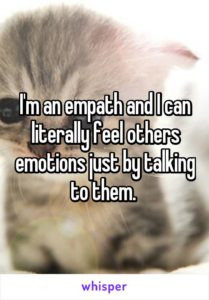 You must harness your empathic sensitivity by becoming emotionally competent. Emotional competency occurs when you can:
You must harness your empathic sensitivity by becoming emotionally competent. Emotional competency occurs when you can:
- Distinguish your emotions from other people’s emotions.
- Have a vocabulary of emotions that are associated with specific feelings
- Label your emotional experience in the moment.
- Reflect another person’s emotions to that person.
- Do all of this effortlessly
At a more advanced level, you are emotionally competent when you
- Take responsibility only for your emotions
- Give responsibility for other people’s emotions back to them
- Do not try to fix people
- Do not try to please others
- Clear ancestral patterns and triggers
- Refuse to take on other people’s pain
- Cultivate compassion and humility
You become fluent in all of these skills by learning how to listen and reflect emotions. This skill, called affect labeling, will teach you how to separate your feelings from someone else’s feelings.
Set Healthy Boundaries
As you learn to distinguish between emotions that belong to you and emotions that belong to others, you will begin to see clear boundaries. You will hold those boundaries so that they do not blur or fuzz out. Consistent practice in affect labeling will help you set healthy boundaries.
Practice Self-Compassion
Self-compassion naturally develops as you see and reflect other people’s feelings. You will stop being judgmental, reactive, and anxious. You may sense the emotions belonging to other people, but they will no longer bother you.
Conclusion: You as an Empath Have a Gift
When you train in emotional competency, you listen others into existence. You confront strong emotions without anxiety. You bring peace to conflict and compassion to suffering. Your gift is cherished by all who know you.
If you want to learn more about developing your emotional competency, check out the Resources tab in the menu.
Like to Join Our Tribe?
Let’s have a joyous conversation that starts today.
Our email rules:
- We don’t spam.
- We don’t sell your email.
- If you don’t open our emails over a period of time, we’ll gracefully unsubscribe you.

WOW, this is amazing! I’ve always felt so alone with all 26 of these empathic indicators. Being empathic has always felt like a gift and a curse… but more often than not, a curse. Growing up, I never knew being empathic was “a thing.” Reading this article made me feel understood and excited to learn more about empathic sensitivity and how to empower myself.